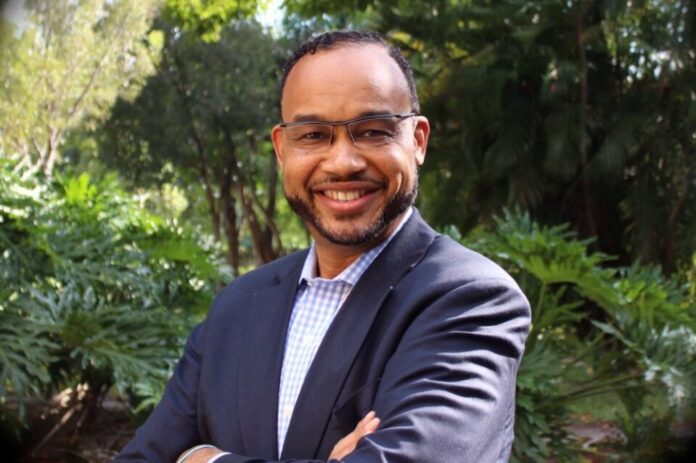“Chills ran up and down my spine,” said prostate cancer survivor Nate Battle. “If I had not gone in for that wellness screening, it would have been a completely different scenario.”
It was only by chance that doctors discovered Nate Battle’s fast-growing prostate cancer.
At age 49, the Del Ray Beach, Florida, businessman had agreed to a full physical to get a discount on his health insurance. Testing conducted for that physical led to the diagnosis of the aggressive cancer which, fortunately, was caught at an early stage.
“In my follow-up appointment, my GP said, ‘You had another six months before things would have gone really bad for you,'” said Battle, now 52. “Chills ran up and down my spine. If I had not gone in for that wellness screening, it would have been a completely different scenario.”
Battle’s experience falls in line with newly published research from Fred Hutchinson Cancer Research Center that shows black men may be at heightened risk not only of developing prostate cancer but also of having a more aggressive form at a younger age.
Scientists discovered more than a decade ago that the rate of prostate cancer among black men was 60 percent higher than in the general population and that these men were twice as likely to die from the disease. But it wasn’t clear whether the higher death rate was because African Americans were receiving lower quality care or because they were more likely to develop a faster growing form of prostate cancer.
The new study, published today in the journal Cancer, offers further evidence that prostate cancer is more prevalent—and can be more aggressive—in blacks and that African-American men are at increased risk of developing the disease at a younger age compared to the general population.
Using computer models and data from the National Cancer Institute’s Surveillance, Epidemiology, and End Results, or SEER, program, a team of researchers led by Fred Hutch biostatistician Ruth Etzioni determined that the higher incidence and death rates were related to differences between black men and the general population in how prostate cancer may develop and progress. They estimated that black men had a relatively higher risk—30 to 43 percent compared to 24 to 29 percent among men in the general population—of developing prostate cancer by age 85.
More specifically, the study showed that, by the time their disease would have been detected without screening, black men with prostate cancer had a risk of 9 to 13 percent that the cancer would have spread beyond the prostate—a risk that is 44 to 75 percent higher than that of the general population. This suggests black men are more likely than others to develop fast-growing prostate cancers.
“That doesn’t mean they all progress faster,” Etzioni said. “But the fraction that progresses faster is higher in this population than in the general population. And the fraction that gets prostate cancer is also higher.”
One thing the researchers couldn’t tell from the models was the root cause or causes of the higher rates—in other words, whether they were due to biological, behavioral or environmental issues.
The new study, which involved investigators from Fred Hutch, the University of Michigan and Erasmus University, comes as experts are re-evaluating the value of the prostate-specific antigen, or PSA, blood test in the general population, which in recent years has become somewhat controversial since the vast majority of cancers it uncovers are very slow-growing.
Earlier this month, the U.S. Preventive Services Task Force issued new recommendations for the PSA test’s use in the general public. The new recommendation backtracked from the previous one, which stated that men should not be screened for prostate cancer. Although the old recommendation was meant to apply to men at average risk of prostate cancer, it meant fewer black men received screening even though they were at higher-than-average risk. In the update, the USPSTF recommended that men between the ages of 55 and 69 should talk to their doctors about getting a PSA test. African-American men should “talk to their clinician about their increased risk of developing and dying of prostate cancer” and men with a family history of the disease should also talk to their doctor “about the potential benefits and harms of screening.”
Etzioni, whose research specifically focuses on the effectiveness of screening for both prostate and breast cancers, believes more guidance may be in order.
“If we know that the cancer is more aggressive in African-American men, it suggests that they should be screened more often,” she said. “And maybe we want to start screening them at a younger age.”
How much younger?
Etzioni and her colleagues said their new findings suggest that black men should have their baseline PSA tested at least three and up to nine years earlier than men in the general population.
Etzioni’s recommendations make a lot of sense to Battle, who hopes research like hers will spotlight the higher risk of deadly prostate cancers among African Americans. Still, he realizes getting more men screened sooner may be a struggle. In general, he said, men tend to be squeamish about “anyone messing around down there for any reason.”
His own case is a good example of how men tend to have a head-in-the-sand attitude toward prostate cancer, he said. Even with nine cases of the cancer in his extended family—four of which resulted in death—Battle said he didn’t want to believe he could be next. None of his older brothers had developed the disease, he said, so cancer wasn’t an issue in his mind until his fateful PSA test.
Now, though, he gives talks to men underscoring the importance of vigilance, telling them “This is not one of those things that you should be thinking, ‘If I ignore it, it will go away.'”
From Fred Hutch News






